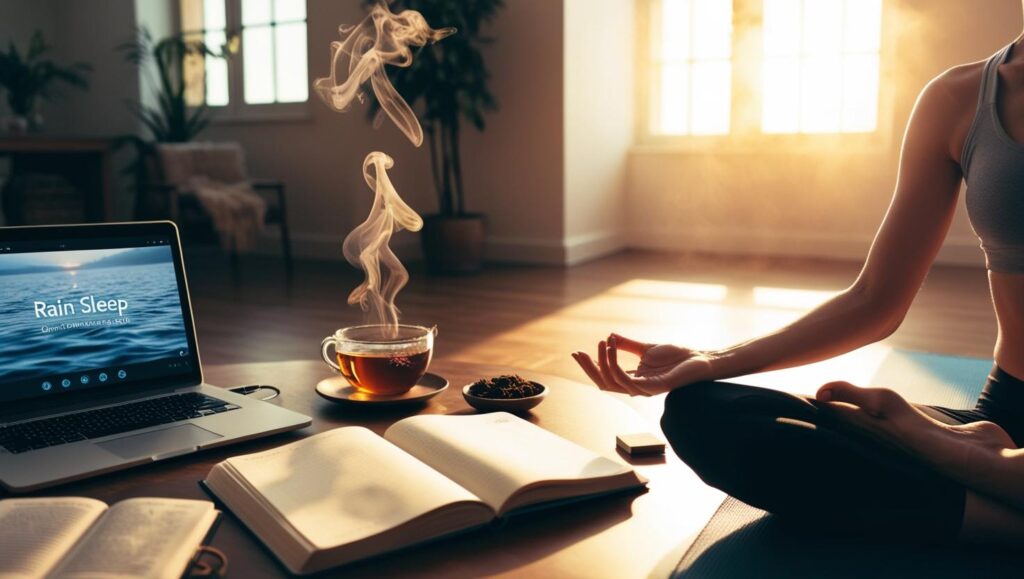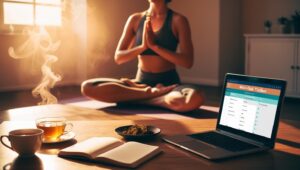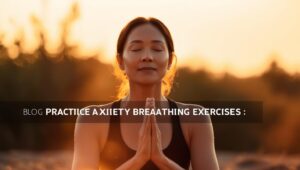Natural Ways to Combat Anxiety: Holistic Tools and Techniques

Natural Ways to Combat Anxiety: Holistic Tools and Techniques
Anxiety can feel like an unwelcome guest, lingering in the background or overwhelming you at unexpected moments. While quick fixes have their place, long-term relief often comes from natural, holistic strategies that nurture your mind, body, and soul. If you’re searching for ways to reduce anxiety naturally without relying on medications, you’re in the right place. From herbal remedies to mindful practices, these five holistic tools and techniques can help you combat anxiety naturally and build lasting calm.
Overwhelmed by daily tasks? Try the free Micro-Task Tracker Chrome extension or Firefox Add-On to simplify your to-do list and ease stress.
Why Choose Natural Anxiety Relief?
 Before diving into the strategies, let’s explore why natural approaches are so effective. Anxiety often stems from a mix of physical, emotional, and environmental triggers, like stress hormones, poor sleep, or overwhelming responsibilities. Holistic methods address these root causes by promoting balance in your body and mind. According to a 2020 study in Frontiers in Psychiatry, lifestyle changes like diet, exercise, and mindfulness can reduce anxiety symptoms by up to 30% over time. These non-pharmaceutical solutions empower you to take control of your well-being with minimal side effects.
Before diving into the strategies, let’s explore why natural approaches are so effective. Anxiety often stems from a mix of physical, emotional, and environmental triggers, like stress hormones, poor sleep, or overwhelming responsibilities. Holistic methods address these root causes by promoting balance in your body and mind. According to a 2020 study in Frontiers in Psychiatry, lifestyle changes like diet, exercise, and mindfulness can reduce anxiety symptoms by up to 30% over time. These non-pharmaceutical solutions empower you to take control of your well-being with minimal side effects.Ready to discover how to reduce anxiety naturally? Let’s explore five powerful techniques that can transform your daily life.
1. Herbal Remedies for Calm
What Are They?
Herbal remedies have been used for centuries to soothe the nervous system and promote relaxation. These natural supplements can be a gentle way to combat anxiety naturally.
Top Picks
-
Chamomile Tea: Known for its calming properties, chamomile contains apigenin, a compound that binds to brain receptors to reduce anxiety. A 2016 study in Phytomedicine found that chamomile significantly lowered anxiety symptoms.
-
Ashwagandha: This adaptogenic herb helps your body manage stress by lowering cortisol levels. Research in Journal of Alternative and Complementary Medicine shows ashwagandha improves anxiety and sleep quality.
-
Valerian Root: Often used for insomnia, valerian can also ease mild anxiety by promoting relaxation.
How to Use Them
-
Brew chamomile tea 1-2 times daily, especially before bed.
-
Take ashwagandha as a capsule or powder (consult a doctor for dosage, typically 300-600 mg daily).
-
Use valerian as a tea or supplement, ideally at night to avoid drowsiness.
Practical Tips
-
Choose high-quality, organic herbs from reputable brands.
-
Pair with a calming ritual, like my black screen rain and thunder sleep video, to enhance relaxation.
-
Consult a healthcare provider, especially if you’re on medications, as herbs can interact.
Struggling to stay organized? The Micro-Task Tracker helps you manage tasks, reducing stress that fuels anxiety.
2. Aromatherapy for a Soothing Escape
Aromatherapy uses essential oils to promote emotional and physical well-being. Inhaling or applying certain scents can calm your nervous system and reduce anxiety naturally.
Best Oils
-
Lavender: Known for its relaxing properties, lavender reduces anxiety and improves sleep, per a 2019 study in Journal of Clinical Nursing.
-
Bergamot: This citrusy oil lowers stress hormones and uplifts mood.
-
Ylang-Ylang: Its floral scent soothes the nervous system and eases tension.
How to Use Them
-
Diffuse 5-10 drops in a room for 20-30 minutes.
-
Add a few drops to a warm bath or mix with a carrier oil (like coconut) for a calming massage.
-
Inhale directly from a tissue or cotton ball for on-the-go relief.
Practical Tips
-
Use a portable diffuser necklace for anxiety relief during the day.
-
Combine with deep breathing while listening to my black screen rain and thunder video for a multi-sensory calm.
-
Store oils in a cool, dark place to preserve potency.
3. Dietary Tips to Support Mental Health
Why It Matters
What you eat can significantly impact anxiety levels. Certain foods fuel stress, while others promote calm by supporting brain health and regulating hormones.
Key Changes
-
Reduce Caffeine: Caffeine can spike cortisol and mimic anxiety symptoms. Limit coffee, tea, and energy drinks.
-
Increase Omega-3s: Found in salmon, walnuts, and flaxseeds, omega-3s reduce inflammation and anxiety, per a 2018 study in JAMA Network Open.
-
Eat Magnesium-Rich Foods: Spinach, almonds, and avocados boost magnesium, which calms the nervous system.
-
Stay Hydrated: Dehydration can heighten stress; aim for 8-10 glasses of water daily.
Practical Tips
-
Swap coffee for herbal tea, like chamomile or peppermint.
-
Add a handful of walnuts or chia seeds to smoothies for omega-3s.
-
Plan balanced meals with lean proteins, whole grains, and vegetables to stabilize blood sugar.
4. Exercise Routines to Lower Cortisol
Exercise is a natural anxiety-buster, reducing cortisol and boosting endorphins. Regular movement rewires your brain for resilience, per a 2021 study in Neuropsychopharmacology.
Best Practices
-
Yoga: Combines movement, breathing, and mindfulness to lower anxiety. Try a 20-minute flow with poses like Child’s Pose or Cat-Cow.
-
Walking: A 30-minute daily walk in nature reduces stress hormones and improves mood.
-
Tai Chi: This gentle, flowing practice calms the mind and body, ideal for all fitness levels.
How to Start
-
Begin with 10-15 minutes daily, gradually increasing to 30 minutes.
-
Follow online yoga or tai chi videos for guided sessions.
-
Pair exercise with calming sounds, like my black screen rain and thunder sleep video, for post-workout relaxation.
Practical Tips
-
Choose outdoor settings for added mood benefits from nature.
-
Listen to your body and avoid overexertion, which can increase stress.
5. Journaling Prompts to Process Anxious Thoughts
What Is It?
Journaling is a powerful tool to untangle anxious thoughts and gain clarity. Writing helps you process emotions and identify triggers, fostering long-term calm.
Effective Prompts
-
What’s the main source of my anxiety today, and why does it feel overwhelming?
-
What’s one small step I can take to feel more in control?
-
Describe a moment when I felt calm and safe—what made it special?
-
What negative thought can I reframe into something positive?
How to Journal
-
Set aside 5-10 minutes daily, ideally in a quiet space.
-
Use a notebook or digital app; no need for perfect grammar.
-
Reflect on your entries weekly to track progress.
Practical Tips
-
Pair journaling with a gratitude practice to boost positivity.
Conclusion: Build a Calmer Life Naturally
Combating anxiety naturally is about nurturing your body and mind with intentional, holistic practices. From sipping chamomile tea to journaling your thoughts, these five strategies—herbal remedies, aromatherapy, dietary changes, exercise, and journaling—offer a roadmap to lasting calm. Start with one or two techniques that resonate with you, and build them into your routine for sustainable relief.
Ready to take the next step? Here’s how to begin:
-
Bookmark this post for easy reference when anxiety creeps in.
Which natural technique will you try first? Share your thoughts in the comments, and spread the calm by sharing this post with someone who needs it!






